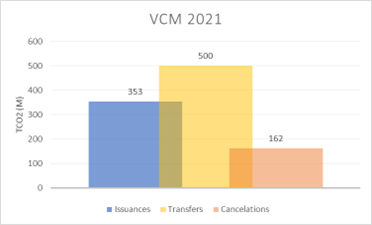Introduction
The generation of carbon credits requires certain general and mandatory steps to be followed. The process begins with a project idea, which will be implemented according to the selected methodology. This will be determined by the standard where the project will be registered. Once this is set, the operation of the project starts. During this period, the project will need to be validated, registered and verified under the standard selected. Finally, it is the time of the issuance of the carbon credits which will correspond to the amount of greenhouse gasses that the project has reduced or avoided in the atmosphere.
The essence of a carbon credit is to offset the unavoidable emissions that result from a productive activity of a company, product or service, therefore, its final destination will be to offset the carbon footprint of an end user. However, right after the issuance, there are two potential operations that could take place after the issuance of the carbon credits: the transfer or the cancellation.
Canceling a Carbon Credit
Canceling a carbon credit means that this carbon credit will be “permanently retired” from the market and may not be transferred to another account, since the main existence reason for carbon credit has been accomplished. For example, if you wished to claim the compensation of the footprint of your organization, you would need to cancel carbon credits on behalf of your company. This ensures that carbon credits are not being claimed by more than one user at a time.
Transfering a carbon credit
The next way forward (and the most common one) is transfering the carbon credits. This operation can be made in major exchange platforms, however, very often, it is carried out in the OTC (Over-the-counter) market, where brokers and traders are the major players. Brokers and traders pursue these transactions in order to make a profit and finally increase the price of this good as a normal commodity. Before the carbon credits find an end customer willing to cancel them, the credits may be transferred between different accounts of the standard registry multiple times.
On the CDM registry, for example, this process is more complicated. Carbon credits can be transferred between different accounts only if the project has a project participant from a country of the first world registered. If this is fulfilled, the project participant can receive the carbon credits from the project owner and then transfer them to different accounts. However, if this is not fulfilled, carbon credits can only be canceled to end customers, which will complicate the commercialization of this good.
Volumes Canceled and Transferred in 2021

According to the voluntary carbon market: 2022 insights and trends report, more than 500 Million tonnes of CO2 were traded in 2021. However, as we can see in the graph, only 162 Million tonnes of CO2 were canceled in the same year. This means that the total amount of carbon credits canceled in 2021 were less than 1/3 of the transferred volume in that year.
Conclusion
In conclusion, carbon credits have become a popular mechanism to finance low carbon projects, but the way they are used can have significant impacts on the effectiveness of climate action. On the one hand, multiple carbon credit transfers can lead to speculation and undermine the environmental benefits. On the other hand, carbon credit cancellations permanently remove credits from the market, which can help ensure that emissions reductions are not undermined by double counting.
While carbon credit transfers may be a useful tool in certain circumstances, they should not be relied upon as the primary means of addressing climate change. Canceling carbon credits, either voluntarily or through regulation, can be an effective way to ensure that carbon offsets are not used to justify continued fossil fuel use or to allow companies to avoid making necessary emissions reductions. Ultimately, it is important to carefully consider the potential impacts of carbon credits and to ensure that they are used in a way that maximizes their environmental benefits.
At ALLCOT Trading we are active in the Carbon Market, canceling and transferring carbon credits in different standards and always looking to promote positive change. If you want to achieve this in a fair, transparent and win-win scenario, contact us and together we will make it happen.



